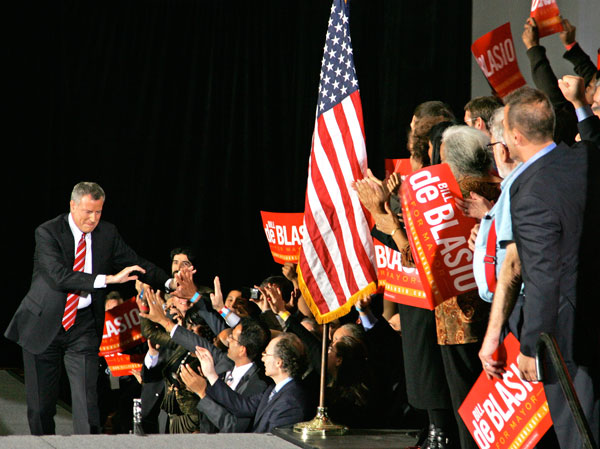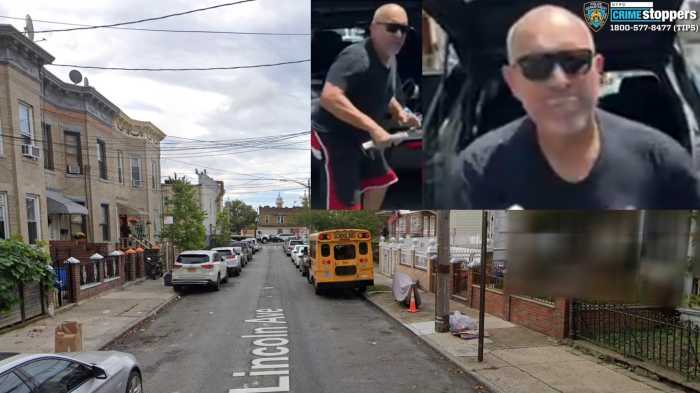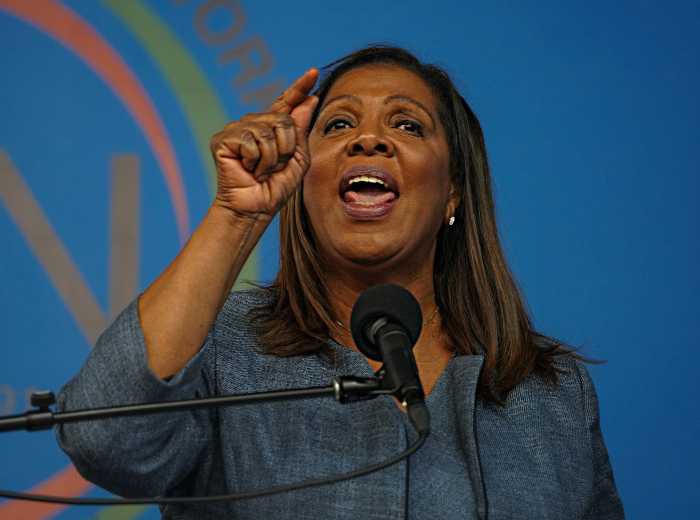
BY WINNIE McCROY | Democratic candidate Bill de Blasio handily won the New York City Mayoral race on November 5 — beating out by 49 points Republican hopeful Joseph J. Lhota, former Deputy Mayor and former Chairman of the Metropolitan Transit Authority, and unaffiliated contender Adolfo Carrion, Jr. Although it was the largest victory in a mayoral race since Ed Koch won in 1985 by 68 points, de Blasio’s rise from low-polling primary candidate to 2014 Gracie Mansion resident was tempered by the fact that voter turnout was at or near a record low.
De Blasio’s landslide victory, foretold by the polls for weeks, gave the impression of an inevitable outcome — and could have kept larger numbers from feeling it necessary to come out and support the former Public Advocate.
De Blasio went into the election with a historically large margin of 43 points among likely voters, compared with Lhota’s 24 percent, according to a Wall Street Journal/NBC 4 New York/Marist survey released on November 3. That lead remained consistent in multiple polls in the last six weeks leading up to the election, as reported by a New York Times/Siena College poll, and the final breakdown was 73 percent de Blasio to Lhota’s 24 percent, with Carrion getting only 1 percent of the vote.

Our next mayor returns the favor, after getting the thumbs up from voters.
“My fellow New Yorkers, today you spoke out loudly and clearly for a new direction for our city,” said de Blasio at the Election Night headquarters at the Park Slope Armory, close to his home. “Make no mistake: the people of this city have chosen a progressive path, and tonight we set forth on it, together, as one city.”
In his concession speech, Lhota was gracious, wishing de Blasio the best while simultaneously offering warnings for the future, and closing with the off-the-cuff rejoinder, “You won’t have me to push around for a while.”
Because Democrats heavily outnumber Republicans in New York City, de Blasio was seen as the de facto winner before Election Day, despite the fact that Republicans have held the city’s top post since 1989. De Blasio is the first Brooklynite to be elected Mayor, and the first Democrat since David Dinkins.
But De Blasio surprised many when he ran away with the Democratic primary from longtime City Council Speaker and presumed frontrunner Christine Quinn. While Quinn’s alliance with Mayor Michael Bloomberg raised many voters’ hackles, de Blasio’s campaign — replete with suggestions that he would crack down on issues like Stop and Frisk — resonated with voters.
“I think we see a mandate for a very progressive administration,” said openly gay Queens Councilman Jimmy Van Bramer, who was present at the Armory event. “I think that because he was a councilmember, he’ll work with us well. I’m a member and founder of the Progressive Caucus, so I expect to be working closely with Mayor de Blasio on a lot of issues that are important to me and my district,” citing affordable housing, expanding pre-K, taxing the wealthy and reforming Stop and Frisk.
During his acceptance speech, de Blasio thanked his staff, volunteers and family for their support, including his Italian family and friends in Rome, adding, “To them I say: grazie a tutti!”

New York City’s mayor-elect makes his way to the podium for a victory speech.
De Blasio had great success in his proposals to raise taxes on the rich to pay for city services, and to have greater oversight of the New York Police Department. And although pundits underscored the difficulties of getting his legislation through Albany’s conservative forces, this did not hamper the public’s enthusiasm for him.
He spoke during his speech on Tuesday of his much-touted “Tale of Two Cities,” saying, “that inequality — that feeling of a few doing very well, while so many slip further behind — that is the defining challenge of our time. Because inequality in New York is not something that only threatens those who are struggling. The stakes are so high for every New Yorker. And making sure no son or daughter falls behind defines the very promise of our city.”
DE BLASIO COOL & COLLECTED IN FINAL TELEVISED DEBATE
De Blasio and Lhota agreed to postpone their final televised debate, set for Tuesday, October 29, in light of the first anniversary of the devastation of Hurricane Sandy.
In a rare joint statement, the two candidates said, “This is the most respectful and appropriate way to honor the memories of those who were lost, and to stand with those who are still struggling to recover.”
When the rescheduled 60-minute debate was held on Wednesday, October 30 on WNBC Channel 4, and the candidates spent time undermining each other’s experience and campaign promises. Lhota attacked de Blasio’s experience managing large organizations as “midlevel jobs,” and de Blasio responded that the Republican candidate’s experience in the Giuliani Administration would be disastrous for the city’s budget.
Less than a week before Election Day, the two sparred on how they would run New York. De Blasio pounded home his representation of “everyday New Yorkers who live in neighborhoods throughout New York who often haven’t gotten the support they need from City Hall.”
De Blasio ran his campaign on promises of addressing economic inequality in the city, strengthening the education system, expanding and protecting affordable housing and creating strong jobs. He angered some with his plan to create a universal pre-K by asking the wealthiest to pay more in taxes.
Lhota called his opponent’s proposals and promises “hopelessly naïve,” and forecast a future of high crime, failing schools and rampant government spending. De Blasio said that under Lhota’s leadership, the current problems experienced under Bloomberg would remain unaddressed.
During the Election Night event, Greenwich Village resident and former AP History teacher Bruce DeSandre said that while it might be difficult for de Blasio to get his reform measures through conservative forces in Albany, “I think the direction will be right and certain policies that are unpopular will be reversed.”
DeSandre, a native New Yorker, touted de Blasio as an early fighter for the preservation of St. Vincent’s Hospital, and hoped that under his administration, these emergency health care resources would be returned to the city.
“Not that he’ll turn it around overnight, but even if some of the development slows and resources go to making some of the developers pay for some local services as well as getting tax breaks, it will be an improvement,” said DeSandre. “I think a lot of them have reneged on promises to build schools and parks… and I think de Blasio will be on top of that. I’ll let you know how Chelsea Market looks with 20 stories above it in a couple of years, and Pier 40 will be one to watch, too.”
AD CAMPAIGN FEATURING BIRACIAL FAMILY RESONATES
A successful ad campaign featuring de Blasio’s biracial son Dante also resonated with voters who were concerned about community/police relations strained by the NYPD’s Stop and Frisk campaign. De Blasio called for true reform for this program, and strong legislation to ban racial profiling. This campaign targets youth of color much like de Blasio’s son, and the immigrants that he calls an essential part of our city.
“The change in this campaign happened when his son, Dante, came out with that big Afro and every politician had to put his family out front,” said Henry Singleton, a member of LU1199, on Election Night. “New York is a diverse town and now they see an interracial family within Gracie Mansion and I think that’s a great accomplishment.”
During the WNBC debate, the moderator cited statistics that show that 90 percent of Stop and Frisk actions don’t apprehend criminals. De Blasio called for reform to make sure these tactics were only used in response to a targeted suspect, and conducted in a way that was constitutionally appropriate.
“What’s to stop people from going into someone’s home? There might be a gun in there? This is a matter of balancing security and civil liberty,” said de Blasio in an conversation with NYC Community Media’s publisher and editors, before the newspapers announced their September 10 Primary endorsements.
He also called for an end to tax breaks for the wealthy and for corporations, proposing a five-year income tax raise for those making more than $.5M, to fix the school system. He also called for mandatory inclusionary zoning, saying that real estate firms would include affordable housing options before they would walk away from important property acquisitions in the city.
For the 52-year-old de Blasio, his decision to have his black, formerly lesbian wife Chirlane McCray and their children Dante and Chiara figure prominently in his ad campaign marked a turning point, making him more relatable to voters in terms of diversity, race and class issues, and showed him to be solid family man. That his son attends public school gives credence to his proposals on education reform.
And for those in Chelsea and Hell’s Kitchen, where construction is currently booming, de Blasio’s promise to “speed up and define the pre-certification timeline” for the ULURP process, as reported in an August 28 Chelsea Now article (chelseanow.com/2013/08/candidates-talk-ulurp-reform) is welcome news.
When questioned about homelessness in the WNBC debate, de Blasio and Lhota defended the city’s “right to shelter” law, more or less, but de Blasio said the 51,000 people in shelters was an all-time high, and that the city should focus on keeping families in their homes with a living wage and paid sick leave, rather than in shelters.
It is likely that once de Blasio moves into Gracie Mansion, he may also move to a more centrist position on some of these issues. But with a campaign that promised New Yorkers just about everything they wanted to hear, even a slight rollback could still mean big changes for the future of the city.
As de Blasio noted in his closing comments on Election Night, “Progressive changes won’t happen overnight, but they will happen. There will be many obstacles that stand in our way, but we will overcome them. And know this: I will never stop fighting for the city I love. And I will never forget that as mayor, I work for you.”





























